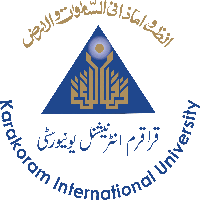The Karakoram International University (KIU) Gilgit, in collaboration with International Centre for Integrated Mountain Development (ICIMOD) and Carleton University, Ottawa, Canada, organized a five-day Permafrost Summer School at Hotel Ambassador Inn, Islamabad from 05 to 09 October 2016. The summer school included 18 participants representing Karakoram International University Gilgit (KIU), National Agricultural Research Centre (NARC), Pakistan Meteorological Department (PMD), World Wildlife Fund for Nature (WWF) Pakistan and Arid Agriculture University Rawalpindi. The trainees consisted of students, faculty members and researchers with varied backgrounds in Glaciology, Geology, Environmental Sciences, Biology, and Physics. Permafrost Special Project from ICIMOD provided needful financial support for organizing this event. This summer school is the follow-up training of the ‘Workshop on Glaciers and Permafrost’, organized in September 2015 at KIU, Gilgit, by KIU and ICIMOD.
Prof. Dr. Stephan Gruber and Mr. Nick Brown from Carleton University Ottawa, Canada facilitated the sessions as resource persons. The training aimed to enhance theoretical understanding and research skills of the participants in various aspects of permafrost including assessment of its likelihood of various landforms, significance in terms of releasing water and solutes, associated threats such as climatic changes, etc.
The course comprised lectures, brainstorming, discussions, data analysis exercises, reading materials and hands-on experience of handling temperature data loggers.
Following some introductory remarks about the course from Dr. A.W Jasra from ICIMOD and Muhammad Zafar Khan from KIU, the first day of training started with a mini assignment, comprising of a group exercise to assess the participant’s current understanding of permafrost. Then technical sessions were carried out on different topics like “Introduction to Permafrost” and “The Earth’s Energy Balance”. Exercises were also conducted to understand the role of the surface energy balance in changing subsurface temperatures, snow cover and how the energy fluxes are related to snow melt or temperature variations.
On day two, participants learned about the “Ground Thermal Regime”, “Mountain Permafrost” and “Permafrost Mapping & Modeling”. To synthesize what participant have learned so far and how to interpret a mountain landscape in the context of the course, some photographs of mountain environments were distributed among groups of 2-3 trainees to identify various landforms that are more likely to possess permafrost or rock glaciers.
On day three and four other important topics related to the subject were covered such as “Climatic changes and Permafrost Thawing; Latent Heat & Phase Change; Development of Ice and Liquid Water in the Ground and “Permafrost Engineering”.
On the fifth and final day, the instructors demonstrated the use of temperature data loggers in the field. This session comprised of hands-on experience in handling permafrost-related field equipment. The day ended with “Final Assignment – Development of Research Project in the Karakorum region” in teams of 3-4 participants under the themes of Permafrost Phenomena, Processes, Observations, Predictions, Water, Ecosystems, Hazards, and Livelihoods.
At the end of the technical sessions, certificates were distributed among participants. While talking to the concluding ceremony Prof. Dr. Stephen Gruber appreciated the efforts of KIU and ICIMOD and said the training workshop was successful in introducing basic knowledge on Permafrost and Cryosphere to the participants. Such training workshops should be encouraged in future too, as many students/professionals choose to take part in special Summer/Winter learning programs to explore their interests, develop new skills, get hands-on experience that a classroom doesn’t offer and meet other students/professionals with similar interests.
Moreover, he said that not much is known about the role of permafrost in the highest mountains of the world, the Himalaya, and the Karakoram, although large parts of these mountains have been identified as permafrost areas. But it is important to study permafrost on-ground because its climate-change induce thaw can lead to slope instability resulting in large landslides and debris flows and it also has an impact on water supply management, especially in small and cold catchments. “This will hopefully be the first step towards research on permafrost in Pakistan”, he added.
To carry forward permafrost research in mountainous regions of Pakistan, ICIMOD provided temperature loggers to KIU representatives, which was much acknowledged and appreciated by KIU authorities. Fieldwork is planned in the coming months in the Khunjerab Pass area, following the Logger Deployment Protocol, which is based on the same methodology used at other study sites in the Hindu Kush Himalayan region by the collaborators.
